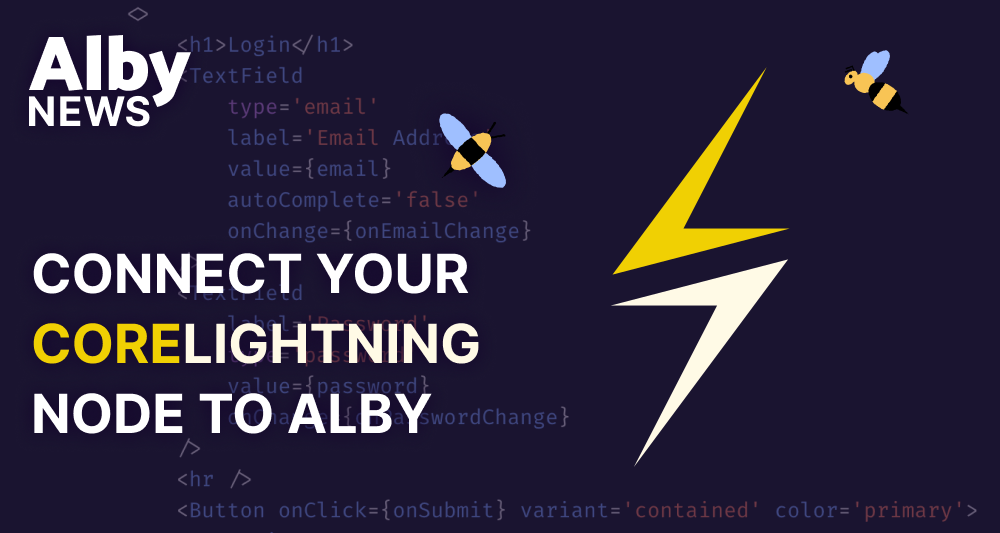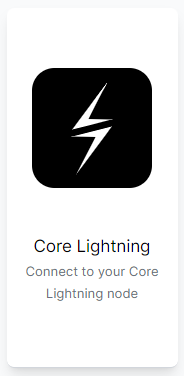Connect your Core Lightning Node to Alby

Alby has taken another step in becoming the app for the whole bitcoin community for everyday use on the web. By integrating other powerful tools on the lightning network, Alby continues to become even more functional. Now every Core Lightning user can easily connect its own node to Alby.
Core Lightning, headed by Blockstream, is one of the four major lightning implementations, alongside LDK, Eclair, and LND. It is a developer-friendly platform that allows users to build new lightning apps. The flexible CoreLightning implementation is a great fit with Alby’s vision of making bitcoin better for everyone on the web.
Increasing its reach across the major lightning implementations is another way that Alby is ushering in a future of hyperbitcoinization. Let’s take a look at how Core Lightning can be integrated with Alby to offer users the financial empowerment made possible with bitcoin on the Lightning Network.
Alby is your bridge to lightning apps on the web
The Alby browser extension is key to experiencing what using bitcoin on the web is like. Alby offers a multitude of options for users looking to connect their own Lightning wallets, giving as many bitcoiners as possible access to applications on the web.
Alby users have the ability to keep their trusted mobile apps and bring them to the browser. When users run their own lightning network node at home or in the cloud, Alby lets users spend their sats directly on the web.
Connect your Core Lightning node
Node operators can now connect their Core Lightning nodes to the Alby browser extension. Core Lightning follows a modular and extensible approach with strong backward compatibility. Like Alby, the team behind Core Lightning is focused on growing in tandem with its community, developing tools that empower one another to contribute to a unified experience on the lightning network. The implementation provides low-level access for individual customization and flexible usage of its lightning network daemons.

Alby aims to implement this flexibility in the connector, passing the strength of Core Lightning through the browser app to the user.
Alby builds on open-source technology
Though the Lightning Network is referred to as a singular entity, it refers to an array of interconnected lightning channels, which is why the network has different implementations. Participants on the Lightning Network benefit when their nodes have the ability to interact seamlessly with one another.
Core Lightning—previously known as c-lightning, and frequently referred to as CLN—has been in production use on the Bitcoin mainnet since the beginning of 2018. Core Lightning offers developers plenty of control over code behavior, characteristic of tools written in the C programming language.
Core Lightning provides a customizable experience for developers, who can make use of only the features they need. Users have access node management tools that can automate node management tasks like opening channels and adjusting fees at strategic times, for instance.
Understanding the Commando plugin
The new connector makes use of the Commando plugin. Recent developments make the implementation of the connector possible despite the limited environment a browser offers.
The Commando plugin is implemented through the lnmessage library, which was developed by Aaron Barnard. lnmessage lets users interact with lightning nodes from their browsers.
It connects to a lightning node via a WebSocket connection and controls a Core Lightning node via Commando RPC calls. This is another example of how powerful the open-source Lightning Network community is, and how individual building blocks grow together to provide more utility for users.
The Commando plugin allows other nodes to send node commands, and lets users send commands to other nodes. The nodes must be authorized and must be directly connected. Authorizations happen through runes. These work similarly to macaroons, which are a feature of the LND ecosystem.
Understanding Runes
Runes can be used to access commands on a node. Each rune contains a unique ID. They can have restrictions inside of them such as “Read-only” when a command can only access specific data but not execute a specific action, for example.
Runes allow users to create a very specific authorization system. For instance, Core Lightning users can give access rights to one specific node peer.
How to connect your Core Lightning node
Users can connect their Core Lightning nodes to Alby easily by following the instructions in the connector tile. Add the host, your public key, the created rune, and off you go!
Now you can control your node from the browser and spend the funds in your wallet seamlessly online. Everything works in a non-custodial setup.
Alby keeps innovating
Alby is at the forefront of the latest Lightning Network developments and incorporates them quickly to provide better services for users. Giving users the choice of which lightning node implementation to use leverages a powerful aspect of the network - its interoperability.
The Lightning Network is moving towards becoming a unified landscape of interconnection, with apps and wallets all working together to benefit users. The Alby browser extension is a manifestation of this potential.
What’s next on the roadmap for the Alby team? Follow the Alby Buzz newsletter to stay abreast of the latest developments, including:
- Tor support
- WebLN support for arbitrary CLN (+plugin) RPC calls
- Fine-grained permissions for WebLN calls
If you wish to link your mobile wallet app to Alby, connect us with the developer. No matter if you are a designer, developer or bitcoin enthusiast with a different background, get in touch to join in on the conversation about bringing bitcoin to the web. As the Alby browser extension is an open-source project, we are appreciative of any contributions and feedback.